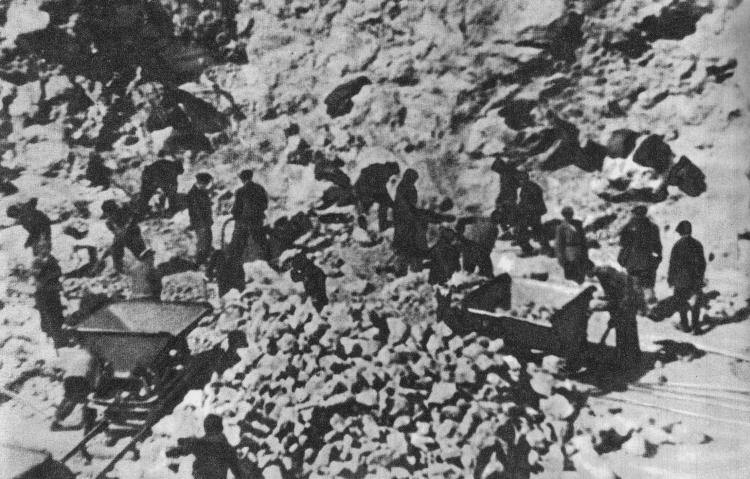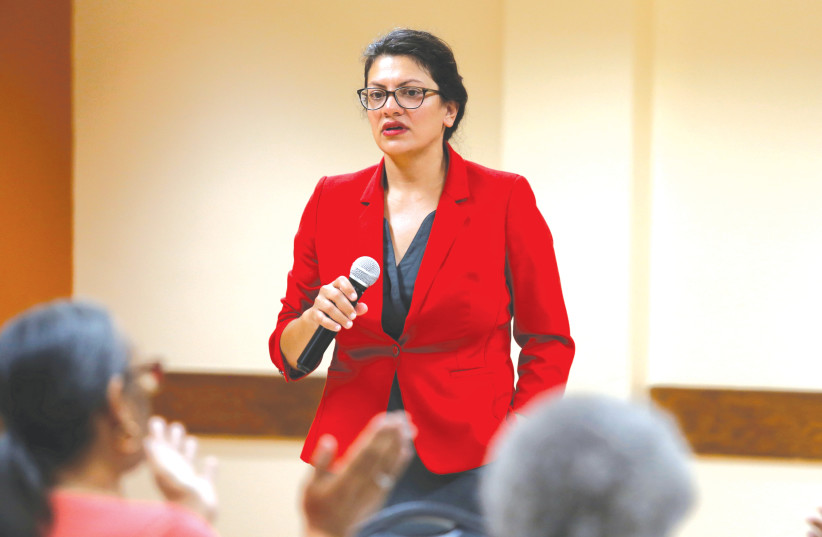 IPN przypomina o tragedii Żydów we Lwowie sprzed 77 lat
IPN przypomina o tragedii Żydów we Lwowie sprzed 77 lat
nno/ wmk/ aszw/
 Więźniowie w Obozie Janowskim we Lwowe. Fot. Wikimedia Commons
Więźniowie w Obozie Janowskim we Lwowe. Fot. Wikimedia Commons
IPN przypomniał, że 19 listopada 1943 r. podczas likwidacji Obozu Janowskiego we Lwowie niemieccy naziści zamordowali kilka tysięcy Żydów. Według szacunków, na terenie obozu w latach 1941-44 śmierć poniosło nawet 100 tys. osób.
“19 XI 1943 r. podczas likwidacji Obozu Janowskiego we Lwowie Niemcy zamordowali kilka tysięcy Żydów. Obóz, po zatarciu śladów zbrodni przestał istnieć w lipcu 1944 r. Szacuje się, że w miejscu tym w latach 1941-44 śmierć poniosło nawet 100 000 osób” – podał w czwartek na Twitterze IPN.
W Obozie Janowskim, w którym Niemcy mordowali również m.in. polskich więźniów politycznych i jeńców sowieckich, umieszczano Żydów przed i po likwidacji w 1942 r. getta lwowskiego, które było jednym z największych w okupowanej Europie. Wielką akcję eksterminacyjną lwowskich Żydów Niemcy rozpoczęli 10 sierpnia 1942 r. i tylko w ciągu dwóch pierwszych tygodni do niemieckiego obozu zagłady w Bełżcu wywieziono ok. 50 tys. Żydów.
“Akcja likwidacji getta, z niewielką przerwą, trwała dwa tygodnie. W ciągu tych (…) dni i nocy naziści oraz ich pomocnicy z policji ukraińskiej polowali na swe ofiary jak doświadczeni myśliwi. Wyciągali je z domów, starannie ukrytych schowków, piwnic, poddaszy i wywozili na stację Kleparów, ładowali do wagonów i odprawiali do komór gazowych lub na rozstrzelanie” – pisał o eksterminacji lwowskich Żydów Jakub Honigsman. (“Zagłada Żydów lwowskich”)
Lwów – znajdujący się od 22 września 1939 r. w rękach sowieckich – został zdobyty przez Niemców 30 czerwca 1941 r. W chwili zajmowania miasta przez wojska niemieckie przebywało w nim ponad 160 tys. Żydów. Już w pierwszych dniach po zajęciu Lwowa Niemcy zaczęli represjonować ludność żydowską.
Rozgłaszano, że lwowscy Żydzi zamordowali wiele tysięcy więźniów politycznych (Polaków i Ukraińców), za których śmierć w rzeczywistości odpowiedzialność ponosili funkcjonariusze NKWD. Żydów bito i mordowano, rabowano ich majątek, nakładano na nich ogromne kontrybucje, palono synagogi i demolowano należące do nich sklepy. Niemcy posuwali się również do świętokradztwa, dewastowali żydowskie cmentarze i zmuszali Żydów do używania macew do budowy chodników miejskich.
22 lipca 1941 r. utworzono lwowski Judenrat, na czele którego stanął adwokat Józef Parnas (został zamordowany w październiku tego roku za odmowę wysyłania Żydów do obozów pracy). Trzy dni później wybuchły w mieście nowe, wyjątkowo krwawe zamieszki antyżydowskie, które przeszły do historii pod nazwą “Dni Petlury” (od nazwiska Symona Petlury, prezydenta Ukraińskiej Republiki Ludowej w latach 1919-1926). Przez kilka dni wymordowano ponad dwa tysiące Żydów.
“Ulice miasta przedstawiały żałosny widok. Przez na wpół opustoszałe ulice przeciągały gromadki wyrostków uzbrojonych w kije, siekiery, noże, łopaty, widły, bijąc w niemiłosierny sposób każdego przechodnia wyglądającego na Żyda” – wspominał świadek wydarzeń Edmund Kessler. (“Przeżyć Holocaust we Lwowie”)
Jeszcze w 1941 roku powstały na terenie dystryktu ośrodki pracy przymusowej dla ludności żydowskiej: Obóz Janowski we Lwowie oraz obozy w Winnikach, Ostrowcu, Kurowicach, Lackach, Drohobyczu, Jaktorowie, Borysławiu i Pluchowie.
We Lwowie powstało także getto, a w jego granicach znalazły się m.in. ulice: Zamarstynowska, Zniesienia, część Warszawskiej i Połtawskiej. Zamknięta dzielnica było położona blisko linii kolejowej Lwów-Tarnopol. Panowały tam katastrofalne warunki egzystencji. Żydzi mieszkali w stłoczonych mieszkaniach, wielu z nich umierało z głodu, chorób (w getcie często wybuchały epidemie tyfusu) i wycieńczenia.
Przez cały czas gestapo prowadziło akcję propagandową zachęcającą mieszkańców miasta do denuncjowania ukrywających się Żydów. Mimo że za pomoc w ich ukrywaniu groziła śmierć, wielu lwowiaków narażało swe życie, aby ich ratować. Wśród Polaków pomagających Żydów byli m.in. Julia Szczepaniuk, Zygmunt Frankowski i Włodzimierz Sokołowski. Żydów ukrywał także polski kanalarz Leopold Socha, główny bohater filmu Agnieszki Holland “W ciemności” (2011).
W czerwcu 1943 r. Niemcy przeprowadzili ostatnią akcję wysiedleńczą w getcie. Natrafiła ona na niespodziewany opór. Podczas jego tłumienia Niemcy zamordowali lub wywieźli do obozów pracy przeszło 20 tys. Żydów. Około trzech tys. z nich popełniło samobójstwo.
Po likwidacji getta Lwów został ogłoszony przez Niemców miastem “wolnym od Żydów” (Judenfrei), nadal jednak funkcjonował Obóz Janowski.
“KZ Janowska do dziś pozostaje mało znany. Jednym z powodów jest fakt, że prawie nikt z więzionych tam ludzi nie przeżył i nie zdołał o swoich doświadczeniach opowiedzieć potomności” – zauważył w swojej książce “Lwów. Portret utraconego miasta” Lutz C. Kleveman. Dodał też, że Obóz Janowski był w istocie obozem zagłady, w którym średnia długość życia więźnia – ze względu na sadyzm esesmanów – wynosiła ok. czterech tygodni. (PAP)
Zawartość publikowanych artykułów i materiałów nie reprezentuje poglądów ani opinii Reunion’68,
ani też webmastera Blogu Reunion’68, chyba ze jest to wyraźnie zaznaczone.
Twoje uwagi, linki, własne artykuły lub wiadomości prześlij na adres:
webmaster@reunion68.com



